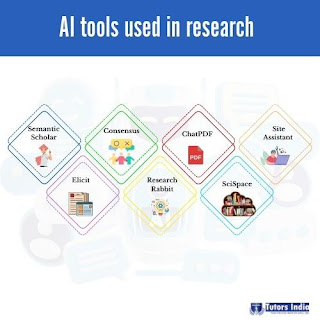Artificial Intelligence (AI) Tools in Scientific Research
The Evolution and Impact of Artificial Intelligence
The concept of Artificial Intelligence (AI) emerged in the 1950s, marking a pivotal moment in technological innovation. Initially promising, progress in AI research was hampered by technological limitations such as data processing capacity and data diversity.
AI is broadly defined as the ability of machines to interpret external data, learn from it, and utilize that knowledge to achieve specific goals. This capability is facilitated by advancements in machine learning, where algorithms enable systems to identify patterns and rules from vast datasets sourced from sources like the Internet of Things (IoT).
In recent years, significant strides in science and technology have revitalized AI, overcoming previous barriers. Today, AI finds applications across diverse fields including business, computer science, biomedicine, supply chain management, and healthcare. Its integration into scientific research has particularly enhanced efficiency and innovation.
Applications of AI in Scientific Research
AI tools have revolutionized scientific research by streamlining processes and enhancing productivity. Academic researchers and students utilize various AI-powered tools to facilitate their dissertations and studies. Here are some notable examples:
Semantic Scholar: This AI-powered search and discovery tool provides access to over 200 million academic papers, offering concise summaries and recommending related publications based on user history and research topics.
Consensus: Powered by GPT-4 and Natural Language Processing (NLP), Consensus analyses scholarly content to provide expert insights and relevant publications, aiding researchers in finding precise information.
ChatPDF: An AI application that allows researchers to interact with PDF documents using advanced AI models, like ChatGPT, without the need for sign-up, facilitating easy access and retrieval of information.
Scite Assistant: This tool helps researchers validate claims by providing real-time citations to published papers, aiding in the development of well-supported research proposals and essays.
Elicit: An AI research assistant that assists in brainstorming, researching, and structuring arguments, enabling scholars to generate ideas and create presentations or posters effectively.
Research Rabbit: Utilizing AI, Research Rabbit organizes research papers into collections, learns user preferences, and recommends relevant publications, facilitating deeper exploration into specific research topics.
SciSpace: An AI-powered portal that simplifies manuscript submission, peer review, and publication processes, helping researchers save time and accelerate the dissemination of their findings.
Ensuring Academic Integrity
While AI tools offer substantial benefits, it's crucial to uphold academic integrity and prevent plagiarism. Researchers should adopt ethical AI practices, understand the purpose of AI tools, paraphrase information appropriately, cite sources accurately, and meticulously proofread AI-generated content to maintain scholarly standards.
Conclusion
Artificial Intelligence has become indispensable across various domains, including scientific research. AI tools such as Semantic Scholar, ChatPDF, SciSpace, Elicit, Scite Assistant, Consensus, and Research Rabbit empower researchers by enhancing efficiency and facilitating deeper insights. As AI continues to evolve, researchers must embrace responsible usage practices to uphold academic integrity while harnessing the full potential of AI in advancing knowledge and innovation.

Comments
Post a Comment